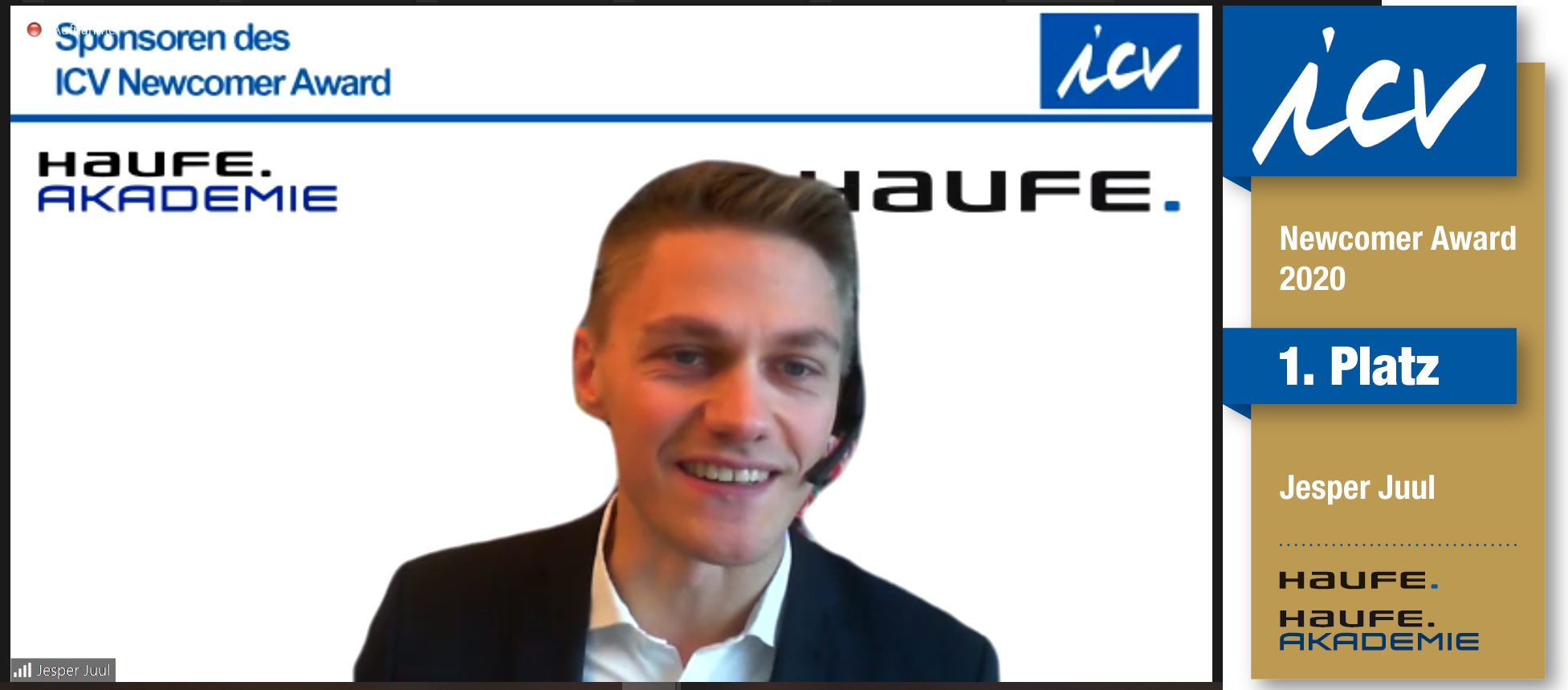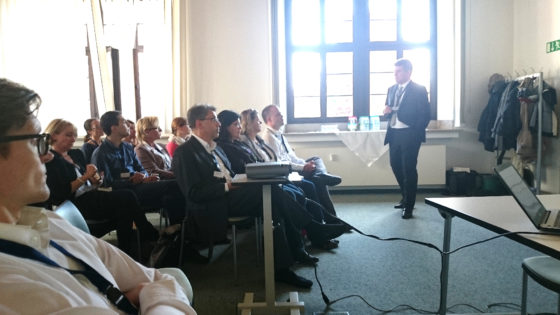Der ICV Newcomer Award 2020 ist heute auf der #CIB2020Controlling an Jesper Juul (Bild) von der Hochschule für Wirtschaft und Recht für die Masterarbeit „The application of performance metrics in earn-out provisions“, betreut von Prof. Dr. Thomas Gruber, verliehen worden. Der zweite Platz ging an Christoph Beis und Andreas Friedrich von der Stockholm School of Economics für die Masterarbeit „The Data Scientist: A Cockoo in the Management Accountant’s Nest?“, betreut von Prof. Dr. Lukas Goretzki. Platz 3 belegte Manuel Mandl mit seiner Arbeit „Use cases and implementation of manufacturing execution systems data in a process mining application“, an der TU München betreut von Matthias Regier und Prof. Dr. Gunther Friedl.
Mit dem Preis für exzellente Studienabschlussarbeiten erkennt der ICV Internationaler Controller Verein die Leistungen von Nachwuchskräften an, die bereits während ihres Studiums innovative wissenschaftliche Lösungen für praktische Probleme des Controllings entwickeln. Der mit insgesamt 4.000 Euro dotierte ICV Newcomer Award wird von Haufe und der Haufe Akademie gesponsert. Seit dem Jahr 2005 wird der Preis alljährlich anlässlich der ICV-Fachtagung CIB – Controlling Inspiration Berlin verliehen.
„Für die Controller-Praxis ist es von großer Bedeutung, dass sich Studierende während ihrer Ausbildung nicht nur mit theoretischen Konzepten und Methoden, sondern auch mit deren praktischer Anwendung und daraus entstehenden Problemen beschäftigen“, erklärt die ICV-Jury-Vorsitzende, Prof. Dr. Nicole Jekel, von der Beuth Hochschule für Technik Berlin. Der Jury gehörten 2020 Christina Keindorf, Konzerncontrolling Deutsche Bahn, Gerhard Radinger, Trainer in der CA Controller Akademie, Ute Schröder von den Controlling-Benchmark-Zirkeln und Solveig Reissig-Thust, Professorin für Controlling an der Hochschule für Wirtschaft und Recht (HWR) in Berlin, an. Bei der Jury-Entscheidung stehen neben der wissenschaftlichen Fundierung vor allem die praktische Relevanz der Fragestellung, die direkte Umsetzbarkeit der entwickelten Konzepte und der Innovationsgrad der Abschlussarbeiten im Mittelpunkt. Darüber hinaus wird die Konformität der Arbeiten mit den Grundsatzpositionen des ICV bzw. deren kritische Diskussion bewertet.
Platz 1 für Masterarbeit zum Thema „Kaufen und Verkaufen“ – „Mergers & Acquisitions“
Die Laudatio zum Gewinner sprach die ICV-Jury-Vorsitzende, Prof. Dr. Nicole Jekel:
„Der Preis ist heiß! Es geht um das Kaufen und Verkaufen, um Mergers & Acquisitions. Wenn Sie ein Unternehmen verkaufen wollen, dann fragen Sie sicherlich: Wieviel Geld bekomme ich für mein Unternehmen? Verkäufer wollen so viel Geld wie nur möglich erhalten. Käufer hingegen wollen natürlich alles so günstig wie nötig zu einem nachhaltigen Wert bekommen. Konkret geht es beim 1. Platz um Earn-outs – also um vertragliche Vereinbarungen – im Rahmen von Unternehmenstransaktionen, die einen Teil des Kaufpreises von der zukünftigen Performance des veräußerten Unternehmens über eine festgelegte Zeit abhängig machen.
Was haben Mergers and Acquisitions mit Controlling zu tun? Eine Menge! Insbesondere geht es um eine betriebswirtschaftliche Beratung bei Unternehmensentscheidungen. Schlicht und einfach geht es um rationale Entscheidungen. Und in dem Zusammenhang wurde bisher wenig geforscht.
Konkret dreht sich somit alles um die Performance-Messung: An erster Stelle geht es meist um EBIT oder EBITDA, an zweiter Stelle um den Umsatz, gefolgt von nachhaltigen Unternehmenswerten bis hin zu nicht-finanziellen Erfolgsmaßen. Wir wissen, dass die Auswahl der Performance-Messung für den Informationsgehalt als auch für eine mögliche Manipulation eine immense Rolle spielen kann. Wenn wir ein Unternehmen verkaufen wollen dann – so sagen Norddeutsche: „wird die Braut geschmückt“. Wie schmücke ich nun eine Braut? Um z.B. die Umsatzzahlen zu boosten, können kurzfristige Aktionen eingeleitet werden, die aber langfristig dem Unternehmen auch eher schaden könnten.
Der Preisträger des 1. Platzes hat sich richtig Arbeit gemacht. Neben einer fundierten Literaturrecherche wurden vier Hypothesen mithilfe von 65 Interviews getestet. Dabei wurden Verkäufer als auch Käufer interviewt. Ich bin jetzt schon gespannt, welche konkreten Erkenntnisse und Tipps wir rund um diese Vertragsgestaltungen bei Unternehmenstransaktionen erhalten.
Aus diesem Grund haben wir unseren ersten Platz an Herrn Jesper Juul mit dem Master-Thema: „The application of performance metrics in earn-out provisions“ von der Hochschule für Wirtschaft und Recht vergeben, betreut von Prof. Dr. Thomas Gruber.“
Der Preisträger stellte im Online-Plenum der CIB 2020 seine Arbeit vor.
Platz 2 für Masterarbeit „Data Scientist: A Cockoo in the Management Accountant’s Nest?“
Die Laudatio für den 2. Platz sprach Jury-Mitglied Ute Schröder:
„Der 2. Platz geht an Christoph Beis und Andreas Friedrich von der Stockholm School of Economics für die Masterarbeit „The Data Scientist: A Cockoo in the Management Accountant’s Nest?“, betreut von Herrn Prof. Dr. Lukas Goretzki.
Wir alle hatten in der Jury schon an dem Titel viel Spaß und haben sofort angefangen, zu diskutieren, ob der Data Scientist den „klassischen Management Accountant“ ablöst und überflüssig macht. Und genau mit dieser Fragestellung setzt sich die Masterarbeit ausführlich auseinander. Sehr gut haben Christoph Beis und Andreas Friedrich heraus-gearbeitet, dass die genaue Aufgaben und Rolle des „Data Scientist“ in den Unternehmen nicht klar beschrieben ist und oft sehr unterschiedlich ausgelegt wird. Deshalb ist ihre klare Empfehlung erst einmal, die Rollendefinition zu schärfen und auch die organisatorische Anbindung zu klären. Sonst entsteht ein Vakuum, das für interne Machtkämpfe und individuelle Ausprägungen der Rolle genutzt werden kann.
U.a. soll der Data Scientist die Geschäftstreiber erkennen, die Daten mit dem Management verstehen und so bereinigen, dass Trends erkennbar werden und ein Blick in die Zukunft über Predictive Analytics gewagt werden kann.
Hier gibt es natürlich Überschneidungen zu der Buchhaltung und dem Controlling. Am besten sollte unter einer Leitung im Team entschieden werden, wer welche Aufgaben hat und wie die Abgrenzung zum Management sinnvoll erfolgen kann. Auf jeden Fall sind sich alle befragten Unternehmen und auch die Studierenden einig, dass die Bedeutung des Data Scientist und die digitale Auswertbarkeit von Daten immer wichtiger wird und stark steigt. Wer dieses Know-how aufbaut und aktiv nutzt, wird zukünftig seinen Erfolg als Unternehmen steigern können. Wenn die Controller und Buchhalter sich dieses Wissen nicht aneignen oder nicht im Team mit den Data Scientisten arbeiten, wird dementsprechend Ihre Bedeutung im Unternehmen als Business Partner zurückgehen.
Dieses Know-how muss somit in den Unternehmen in allen Bereichen gefördert werden und wird nicht zuletzt auch vom dem CFO der Zukunft gefordert werden.“
Platz 3 für „Anwendungsfälle und Implementierung von Daten aus Fertigungssystemen in einer Process-Mining-Anwendung“
Die Laudation für den Drittplatzierten sprach Professorin Solveig Reissig-Thust:
„Den 3. Platz haben wir an Manuel Mandl für seine Arbeit zum Thema „Use cases and implementation of manufacturing execution systems data in a process mining applicati-on“ (also: Anwendungsfälle und Implementierung von Daten aus Fertigungssystemen in einer Process-Mining-Anwendung) vergeben. Die Arbeit wurde von Herrn Matthias Re-gier und Prof. Dr. Gunther Friedl an der TU München betreut.
Die Digitalisierung im Controlling ist ein absolut spannendes und nach wie vor hochaktuelles Forschungsgebiet. Da wundert es auch nicht, dass sich zahlreiche Abschlussarbeiten mit diesem Thema beschäftigen. Leider kratzen aber viele nur an der Oberfläche und bleiben bei allgemeinen Aussagen. Besonders begeistert hat uns als Jury daher die Arbeit von Herrn Mandl. Sie zeigt sehr eindrucksvoll ein konkretes Anwendungsbeispiel für ein datenbasiertes Produktionscontrolling.
Herr Mandl entwickelt in seiner Arbeit eine Applikation basierend auf Produktionsdaten eines internationalen Konzernunternehmens. Mit Hilfe der neuartigen Methode des Process Minings können weltweit tagesaktuelle Daten aus dem Produktionsprozess gewonnen werden. Die Vorteile für das Controlling liegen auf der Hand – denkt man an verbesserte Steuerung, Planung und Kontrolle der Produktionsabläufe. Besonders interessant fanden wir auch die Darstellung der Prozessvisualisierung, die es ermöglicht, den Produktionsprozess in Echtzeit abzubilden und damit sofort Abweichungen und Ineffizienzen zu erkennen.
Die Arbeit von Herrn Mandl beeindruckt auf der einen Seite durch das sehr detallierte technische Detailwissen, auf der anderen Seite aber auch durch die sehr systematische und gut nachvollziehbare Darstellungsweise. Sie leistet damit einen wichtigen Beitrag für die Forschung im Bereich der Produktionsdatenanalyse. Gleichzeitig ist sie interessant für alle Praktiker, die an einer Erhöhung der Effizienz und Transparenz ihrer Produktionsprozesse interessiert sind.“
Gratulation den Preisträgern 2020 und ihren betreuenden Professoren! Danke allen Bewerberinnen und Bewerbern! Ein besonderes Dankeschön der Jury und den unterstützenden CIB-Organisatoren!
The ICV Newcomer Award 2020 is given at the #CIB2020Controlling today to Jesper Juul (picture) from the University of Economics and Law for the master thesis “The application of performance metrics in earn-out provisions”, supervised by Prof. Dr. Thomas Gruber. Second place went to Christoph Beis and Andreas Friedrich from the Stockholm School of Economics for the master thesis “The Data Scientist: A Cockoo in the Management Accountant’s Nest?”, supervised by Prof. Dr. Lukas Goretzki. Third place went to Manuel Mandl with his thesis “Use cases and implementation of manufacturing execution systems data in a process mining application”, supervised by Matthias Regier and Prof. Dr. Gunther Friedl.
With the award for excellent final theses, the ICV International Association of Controllers recognizes the achievements of newcomers who develop innovative scientific solutions for practical controlling problems during their studies. The ICV Newcomer Award, endowed with a total of 4,000 Euros, is sponsored by Haufe and the Haufe Academy. Since 2005 the Award has been presented annually at the ICV conference CIB – Controlling Inspiration Berlin.
“For controller practice, it is of great importance that students not only deal with theoretical concepts and methods during their education, but also with their practical applications and problems that arise from them,” explains the ICV Jury Chairman, Prof. Dr . Nicole Jekel, from the Beuth University of Applied Sciences Berlin. The Jury 2020 included Christina Keindorf, Group Controlling Deutsche Bahn, Gerhard Radinger, trainer at the CA Controller Academie, Ute Schröder from the Controlling Benchmark Circle and Solveig Reissig-Thust, Professor of Controlling at the University of Economics and Law (HWR) in Berlin. In addition to the scientific foundation, the Jury’s decision primarily focuses on the practical relevance of the question, the direct feasibility of the developed concepts and the degree of innovation of the thesis. In addition, the conformity of the work with the basic positions of the ICV or their critical discussion is assessed.
1st place for the master thesis on the topic – „Mergers & Acquisitions“
The laudation for the winner was given by the ICV Jury Chairman, Prof. Dr. Nicole Jekel:
“The Award is hot! It’s about buying and selling, about mergers & acquisitions. If you want to sell a company, you are sure to ask: How much money do I get for my company? Sellers want to get as much money as possible. Buyers, on the other hand, want to get everything as cheaply as necessary at a sustainable value. Specifically, the 1st place is about earn-outs – i.e. contractual agreements – in the context of corporate transactions that make part of the purchase price dependent on the future performance of the company over a specified period of time.
What do mergers and acquisitions have to do with controlling? A lot! In particular, it is about business advice for company decisions. Quite simply, it’s about making rational decisions. And little research has been done in this context do far.
In concrete terms, everything revolves around performance measurement: First and foremost, it is mostly about EBIT or EBITDA, secondly about sales, followed by sustainable company values and non-financial measures of success. We know that the selection of the performance measurement for the information content as well as for a possible manipulation can play an immense role. If we want to sell a company then – as North Germans say: “the bride will be decorated”. How do I decorate a bride now? To e.g. boost sales figures, short-term actions can be initiated, which, however, could also damage the company in the long term.
The winner of the 1st place has done a real job. In addition to a thorough literature research, four hypotheses were tested using 65 interviews. Both sellers and buyers were interviewed. I am already curious to see what specific knowledge and tips we receive on all aspects of these contractual arrangements for corporate transactions.
For this reason we have awarded our first place to Mr. Jesper Juul with the master topic: “The application of performance metrics in earn-out provisions” from the University of Economics and Law, supervised by Prof. Dr. Thomas Gruber.”
The award winner presented his work in the online plenum of the CIB 2020.
2nd place for the master thesis „Data Scientist: A Cockoo in the Management Accountant’s Nest?“
Jury member Ute Schröder gave the laudation for the 2nd place:
“The 2nd place goes to Christoph Beis and Andreas Friedrich from the Stockholm School of Economics for the master thesis” The Data Scientist: A Cockoo in the Management Accountant’s Nest?”, supervised by Prof. Dr. Lukas Goretzki.
In the Jury, we all had a lot of fun with the title and immediately started to discuss whether the data scientist should replace the “classic management accountant” and make them superfluous. And this is exactly the question the master thesis deals with in detail. Christoph Beis and Andreas Friedrich have worked out very well that the exact tasks and role of the “data scientist” in the company is not clearly described and is often interpreted very differently. Therefore, their clear recommendation is first of all to sharpen the role definition and also to clarify the organizational connection. Otherwise a vacuum is created that can be used for internal power struggles and individual characteristics of the role.
Among other things the data scientist should recognize the business drivers, understand the data with the management and clean it up in such a way that trends can be identified and a look into the future can be ventured using predictive analytics.
Of course, there is overlap here with accounting and controlling. It is best to decide under a management team who has which tasks and how the delimitation from management can be meaningful. In any case, all of the companies surveyed, as well as the students, agree that the importance of the data scientist and the digital evaluability of data is becoming more and more important and growing rapidly. Those who build up and actively use this know-how will be able to increase their success as a company in the future. If the controllers and accountants do not acquire this knowledge or do not work in a team with the data scientists, their importance in the company as a business partner will decrease accordingly.
This know-how must therefore be promoted in all areas of the company and will be demanded from the CFO of the future.”
3rd place for für “Use cases and implementation of manufacturing execution systems data in a process mining application”
The laudation for the third place winner was given by Professor Solveig Reissig-Thust:
“We gave the 3rd place to Manuel Mandl for his work on “Use cases and implementation of manufacturing execution systems data in a process mining application” (meaning use cases and implementation of data from manufacturing systems in a process mining application). The work was carried out by Mr. Matthias Regier and Prof. Dr. Gunther Friedl at the Technical University of Munich.
Digitization in controlling is an absolutely exciting and still highly topical research area. So it is not surprising that numerous theses deal with this topic. Unfortunately, many only scratch the surface and stick to general statements. As a Jury, we were particularly enthusiastic about Mr. Mandl’s work. It shows very impressively a concrete application example for data-based production controlling.
In his thesis, Mr. Mandl develops an application based on production data from an international group company. With the help of the new method of process mining, up-to-date data from the production process can be obtained worldwide. The advantages for controlling are obvious – if you think of improved management, planning and control of production processes. We also found the display of the process visualization particularly interesting, as it enables the production process to be mapped in real time and thus immediately recognize deviations and inefficiencies.
The work of Mr. Mandl impresses on the one hand with the very detailed technical knowledge, on the other hand also with the very systematic and easily comprehensible presentation. It thus makes an important contribution to research in the field of production data analysis. At the same time, it is interesting for all practitioners who are interested in increasing the efficiency and transparency of their production processes.”
Congratulations to the 2020 Award winners and their supervising professors! Many thanks to all applicants! A special thank you for the Jury and the supporting CIB organizers!




Sehr geehrte Damen und Herren,
wäre es möglich, dass ich als ICV-Mitglied die Masterarbeit über den Data Scientist zugestellt bekommen könnte? – Ein sehr interessantes Thema, was mich als Controlling-Professor neugierig macht.
Vielen Dank und beste Grüße!
Ralf Schlemminger/Hochschule Bremen
Sehr geehrter Herr Professor Schlemminger, wir haben Ihre Anfrage weitergeleitet. H.-P. Sander/ICV-Kommunikationsteam